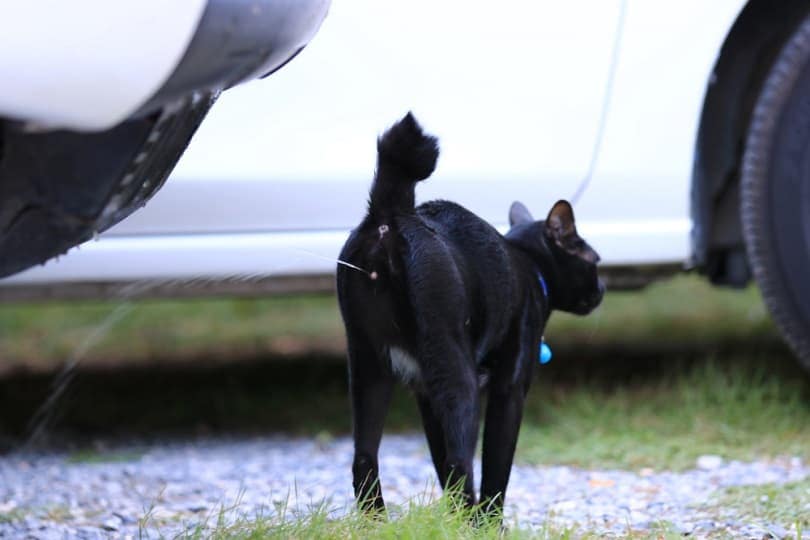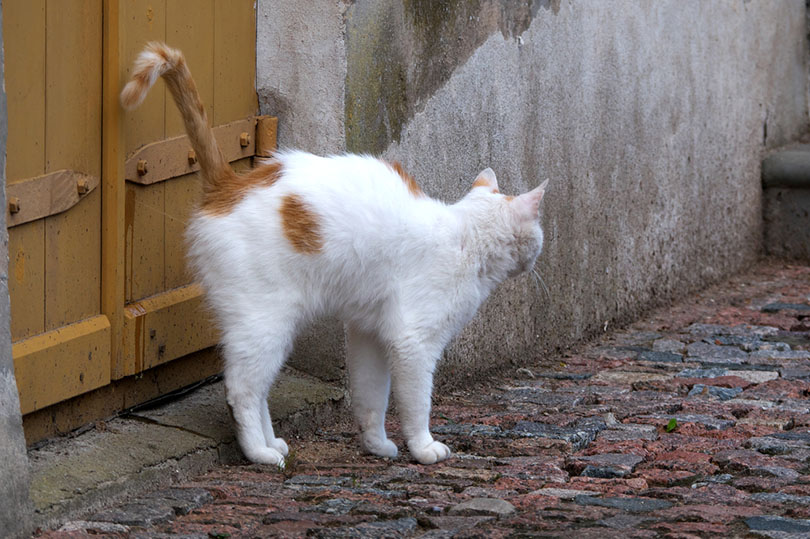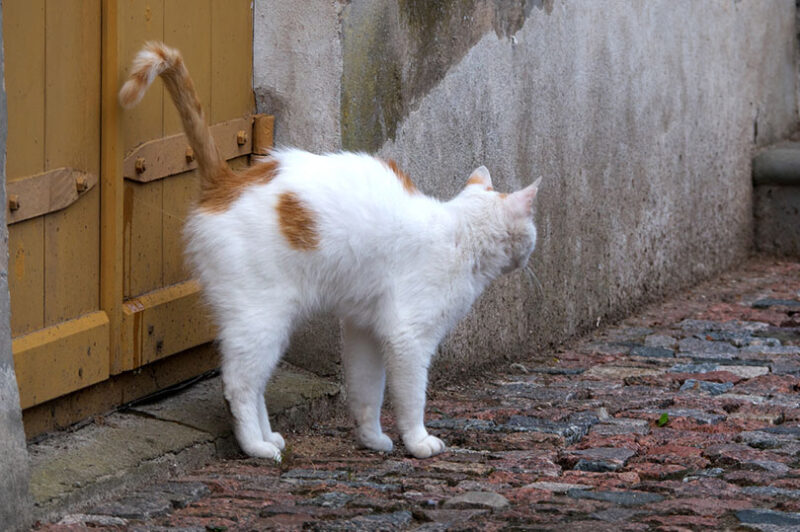If you’ve ever seen your cat back up to a wall, the couch, or anywhere that is a vertical surface and spray urine, it’s called urine marking or spraying. Cats indeed spray to mark their territory, especially if they are intact (not spayed or castrated, also referred to as neutered or sterilized).
Cat spray has a pungent odor, which is usually more intense than urine. Scent-marking is common in animals, with the scent cues remaining in the environment for a relatively long time, even in the absence of the animal, making it very valuable compared to visual or auditory cues.
How Bad Does Cat Spray Smell?
Well, it’s not great. You can identify cat spray by an overwhelming ammonia odor mixed with other pungent odors. Unlike the urine smell from the litter box, the spray has other pheromones in it, particularly if a still-intact cat (a sexually mature male or female) sprays. These pheromones are intended to pass messages to other members of their species. They can relay messages ranging from “stay out” to signaling reproductive status.
Some pet owners think it has a sulfur odor, but the smell may vary, depending on the cat. You’ll smell ammonia more than anything else, but the spray may also have a musky scent. When marking, cats deposit less urine than when urinating, as the intention of spraying isn’t to void their bladder.

Why Do Cats Spray?
There are various reasons that a cat sprays, and while female and male cats can spray, it’s mostly unneutered male cats that do it. We’ll talk about why cats spray below.
1. Conflict
A cat will spray if there is any conflict in the household. For example, if you have multiple cats in your home, they may spray to establish boundaries and even to settle feline arguments. If one of your cats shows dominance over the others with the food or litter box, they may start spraying certain areas.
Buying another litter box or two so the competition ends may solve the problem. However, it isn’t guaranteed to curb the issue. The number of litter boxes in your house should be equal to the number of cats you have, plus one. For example, if you have two cats, the minimum number of litter boxes you should have is three.
2. Territorial Marking/Mating
If your cat hasn’t been neutered or spayed, they may be spraying around your property to attract a mate. Neutered or spayed cats can still spray, but it’s rare. Cats mark their territory by spraying to show competitors that your home is part of their range, and they also spray to attract the opposite sex. They usually spray on vertical surfaces.

3. Additional Causes
There are a few other reasons that your cat could be spraying, including moving the cat to another house or putting them in a stressful situation. Stress can cause a cat that didn’t spray before to begin spraying everything in the house. If your cat is stressed, try to find the cause to resolve the issue.
For instance, if you just moved, ensure your cat has a quiet room to enjoy their bed, cat tree, and toys. Spend more time playing with your cat and try to keep the same feeding schedule as you did at your old home. After a few days or weeks, your cat should become more comfortable with the environment and hopefully stop spraying.
The pungent aroma from cat spray can overwhelm your senses and harm your loving relationship with your cat, but there are a few ways to curb the spraying.
- Have your cat neutered or spayed
- Provide enough food bowls and litter boxes (one for each cat, plus one) for all your cats
- Spend more time with your cat and comfort them in their new home
- Build a catio or similar if you keep your cat indoors all the time.
- Take your cat to the vet if they display other troubling signs
- Clean up cat spray with an enzymatic cleaner to prevent accidents in the same spot

Conclusion
Cat spray is an extremely pungent smell that is hard to miss. While it may look like your cat is urinating on the wall, they’re actually releasing a powerful urine with pheromones that work to communicate with other cats. If your cat is spraying and you can’t get them to stop or find a reason for the behavior, it’s best to make an appointment with your vet to determine the problem. Your cat may be stressed or sick, or maybe you just need to have them fixed to remedy the situation.
Featured Image Credit: Igor Shoshin, Shutterstock











